Strike action: How current disputes compare to the miners' strike
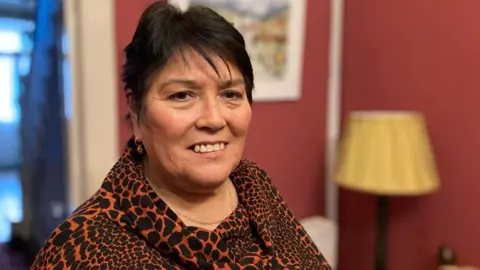 BBC
BBC"I'm jealous in a way," said Siân James, reflecting on how today's strikes compare to her own experiences.
For those like her who were part of the 1984-85 miners' strike, ongoing industrial disputes have provided an opportunity to revisit that period.
A miner's wife at the time, Ms James was part of the support networks that helped families through the strike.
She would later become an MP, and be portrayed by Jessica Gunning in the 2014 Bafta-winning film Pride.
"It changed my life," said the 63-year-old in her in Neath home, sitting beneath a painting of a scene from the strike.
"I wouldn't be where I was at Westminster, and where I am today as a character, if it hadn't been for the strike.
"I can honestly say that my war was a good war."
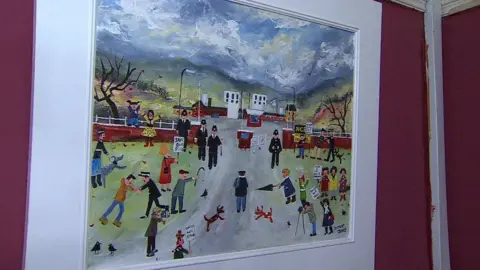
In recent weeks Ms James has been reflecting on how the miners' strike compares with today's disputes, where members belonging to several unions have been engaged in industrial action.
"We were a union that was standing alone," she said.
"I'm jealous in a way because if we'd had during the miners' strike several industries standing together, taking it in turns to share the responsibility and the action, I think the outcome could have been very different."
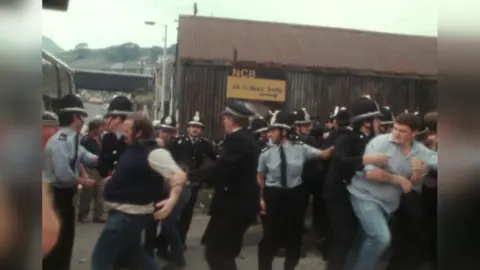
Now 77, Tyrone O'Sullivan was a branch secretary of the National Union of Miners in the mid-1980s.
He was also a flying picket - quickly mobilising busloads of miners to join the picket line at various collieries.
"We had to fight the fight," he said.

"It's a wonderful feeling, and strikes give you that feeling. Win, lose or draw you still fought the battle," he said.
But in the years following the strike, Mr O'Sullivan believes the unions took a step back, believing "if the miners can be defeated, who can win?".
"The next 10 years were pathetic. The unions - they went to sleep," he said.
"And that's one of the things I regretted for 30 years - they put their ties and their suits on," Mr O'Sullivan added.
"But they're turning around now aren't they? They're throwing their ties away, they're getting out on the picket line."
Nicholas Jones was an industrial correspondent for the BBC throughout the 70s and 80s.
The Abergavenny-born reporter said the main difference between the miners' strike and today's disputes is that it's "very hard now for the government of the day to demonise union leaders".
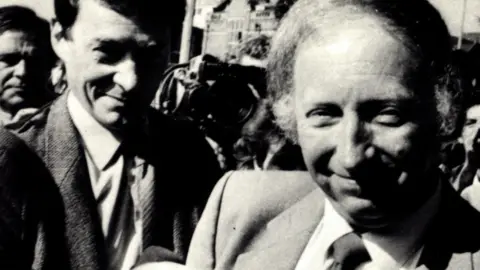 Nicholas Jones
Nicholas JonesDuring the miners' strike Mr Jones said "there was a lot of criticism of the violence on the picket lines, but today there isn't".
"Those are peaceful protests outside railway stations and hospitals - flag-waving union members."
After 40 years of steady decline, the most recent UK government stats show that the union membership rate across the UK hit a record low of 23.1% in 2001.
However they also show that during the same year in Wales the percentage of employees who were part of a union increased to 35.6%.
 Getty Images
Getty ImagesThe statistics have been analysed by a team of researchers at the Wales Institute of Social and Economic Research and Data which includes Prof Alex Bryson.
He said there's evidence that in some parts of the country being part of a union is "in the blood and in the water".
"We've done some work which shows that union membership is transmitted across generations within families.
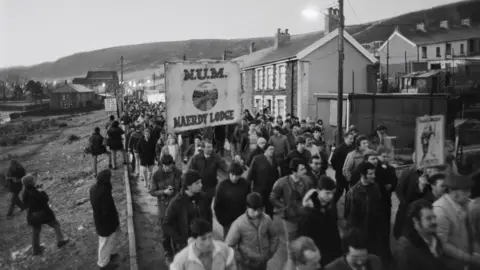 Getty Images
Getty Images"There's also evidence that it's in the water in the sense that the geographical location where you're located in Wales can really have a profound effect on the possibility that you too are going to be a union member.
"That's partly linked to the industries that used to be there on that land. Essentially unionisation is etched into the landscape."
Politics Wales is on BBC One Wales at 10:00 GMT on 29 January and on BBC iPlayer

- BBC WALES INVESTIGATES: The subjects affecting the lives of people in Wales
- A CAREER CHANGE WITH A DIFFERENCE: Police new recruits adapt to life on the beat

